Over 30 years of anarchist writing from Ireland listed under hundreds of topics
The Left
Anarchist Eyewitness to self-management in Kurdish Syria / West Kurdistan
Zaher Baher of the Kurdistan Anarchists Forum spent two weeks in Syrian Kurdistan in May 2014, looking at the experiences of self-management in the region, experiments that have become more widely discussed as the result of the defense of Kobane against ISIS. This account tells in some detail what he saw and what conclusions he draws. Zaher is also a member of Haringey Solidarity Group and spoke at the 2014 London Anarchist Bookfair about his experiences. This account was originally published as 'The experiment of West Kurdistan (Syrian Kurdistan) has proved that people can make changes'

Radical writings on Intersectionality, privilege, identity and difference
This is a list of radical writings around the issues of intersectionality, privilege (theory), identity (politics), and difference.
Insurrections at the intersections: feminism, intersectionality and anarchism
A critique of liberal conceptions of 'intersectionality' and an outline of an anarchist, class struggle approach.
We need to understand the body not as bound to the private or to the self—the western idea of the autonomous individual—but as being linked integrally to material expressions of community and public space. In this sense there is no neat divide between the corporeal and the social; there is instead what has been called a “social flesh.” - Wendy Harcourt and Arturo Escobar1
Revolutionary organisation in the digital age - audio from a speaking tour of Norway
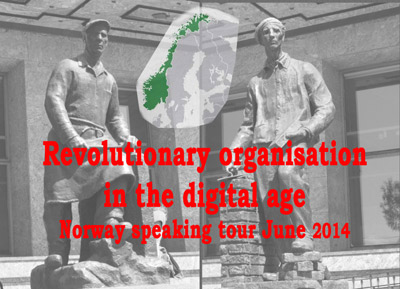 It is a confusing time to be on the revolutionary left as everything that was once certain turns to smoke.
It is a confusing time to be on the revolutionary left as everything that was once certain turns to smoke.
Technology has overturned and remade what constitutes effective communication and the construction of networks.
Quite how to organise is no longer clear, while old reference points of 1917, 1936 or even 1968 no longer provide definitive models.
Translating Anarchy: The Anarchism of Occupy Wall Street - talk by Author Mark Bray
Talk by Mark Bray, author of Translating Anarchy: The Anarchism of Occupy Wall Street followed by an hour of discussion.
Translating Anarchy tells the story of the anti-capitalist anti-authoritarians of Occupy Wall Street, who strategically communicated their revolutionary politics to the public in a way that was both accessible and revolutionary.
Translating Anarchy: The Anarchism of Occupy Wall Street - talk by Author Mark Bray in Dublin by Workers Solidarity on Mixcloud
Rallies, ‘Black Bloc’ and the Meaning of Direct Action
Over the last couple of months we have witnessed an unprecedented wave of large demonstrations. Across Australia people have risen in opposition to the current administration’s escalation of attacks on worker’s rights and conditions, erosions of living standards and civil liberties.
Gustavo Esteva Interview
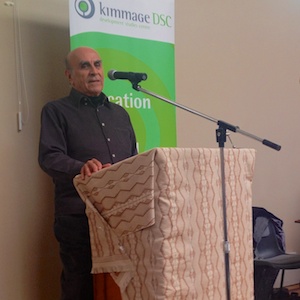 Gustavo Esteva is an independent writer and grassroots activist. He has been a central figure in a wide range of Mexican, Latin American, and international nongovernmental organizations and solidarity networks, including the Universidad de la Tierra en Oaxaca and the Zapatistas. The WSM's Tom Murray caught up with Gustavo at a recent public lecture at the Kimmage Development Centre to discuss hope, friendship and surprise in the zombie-time of capitalism, and how people are taking initiatives, reclaiming control of their lives and creating vibrant, autonomous alternatives here today.
Gustavo Esteva is an independent writer and grassroots activist. He has been a central figure in a wide range of Mexican, Latin American, and international nongovernmental organizations and solidarity networks, including the Universidad de la Tierra en Oaxaca and the Zapatistas. The WSM's Tom Murray caught up with Gustavo at a recent public lecture at the Kimmage Development Centre to discuss hope, friendship and surprise in the zombie-time of capitalism, and how people are taking initiatives, reclaiming control of their lives and creating vibrant, autonomous alternatives here today.Review: 100 Years Later: The Legacy of the 1913 Lockout.
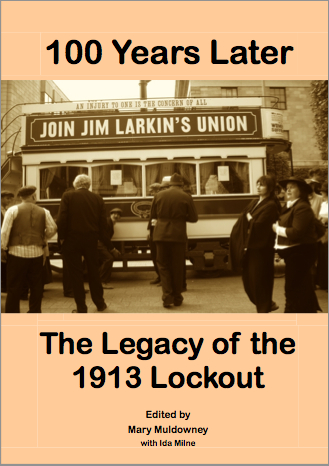 History has traditionally been viewed through the prism of ‘great leaders’ or ‘powerful men’ (and it usually is men). In recent years, however, the importance of community or local history – and the contributions of ‘ordinary’ people to great events – has been recognised. To paraphrase Jim Larkin “The great leaders only appear great because of the commitment, sacrifice and energy of ordinary people”.
History has traditionally been viewed through the prism of ‘great leaders’ or ‘powerful men’ (and it usually is men). In recent years, however, the importance of community or local history – and the contributions of ‘ordinary’ people to great events – has been recognised. To paraphrase Jim Larkin “The great leaders only appear great because of the commitment, sacrifice and energy of ordinary people”.Review: David Graebers ‘The Democracy Project’.
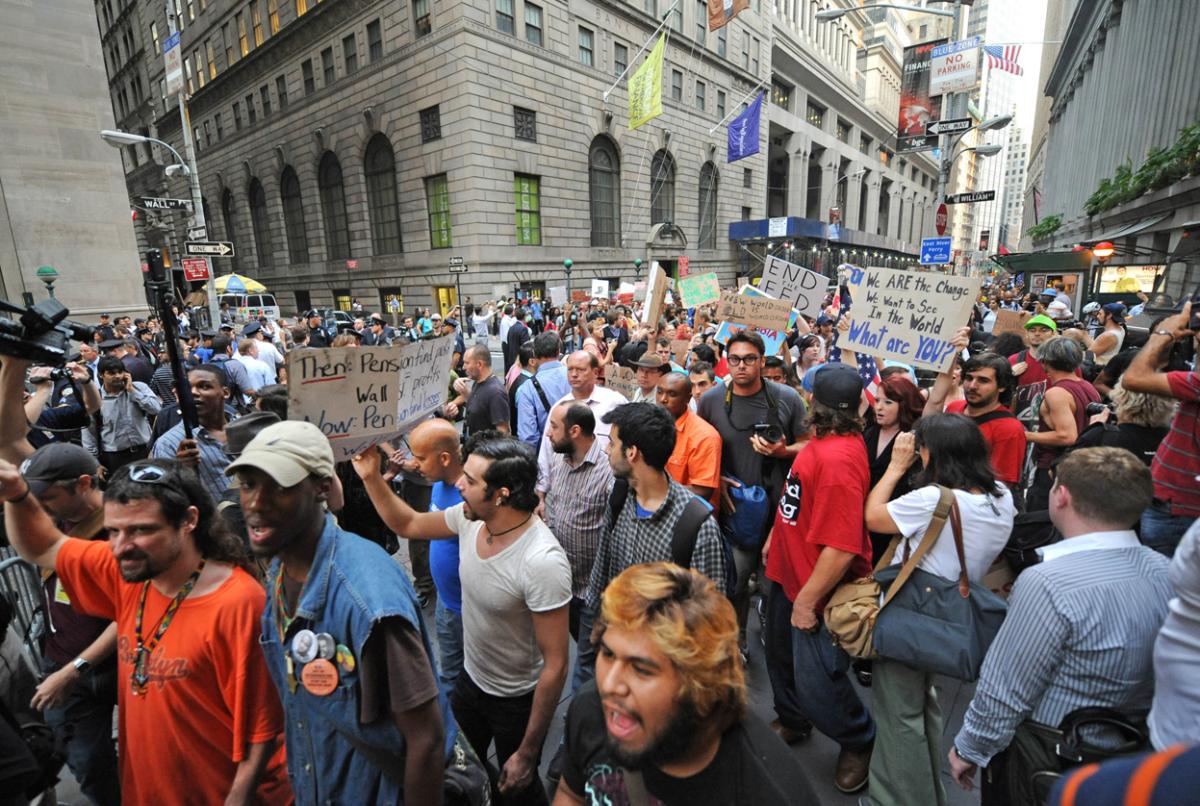 Many of us have an Occupy story. Mine took place in New York on March 17th of 2012, the six-month anniversary of the first occupation of Zuccotti Park, and the three-month anniversary of its eviction. I joined about five hundred or so Occupiers who had gathered after dark on the Manhattan side of Brooklyn Bridge. As we marched the three blocks or so to reclaim Zuccotti Park, NYPD’s finest, fully armed, literally lined the street each step of the way. And in the park itself a surveillance tower loomed overhead.
Many of us have an Occupy story. Mine took place in New York on March 17th of 2012, the six-month anniversary of the first occupation of Zuccotti Park, and the three-month anniversary of its eviction. I joined about five hundred or so Occupiers who had gathered after dark on the Manhattan side of Brooklyn Bridge. As we marched the three blocks or so to reclaim Zuccotti Park, NYPD’s finest, fully armed, literally lined the street each step of the way. And in the park itself a surveillance tower loomed overhead. Review of Gustavo Esteva’s talk on Anarchy and Buen Vivir at Kimmage - All Power to the Imagination
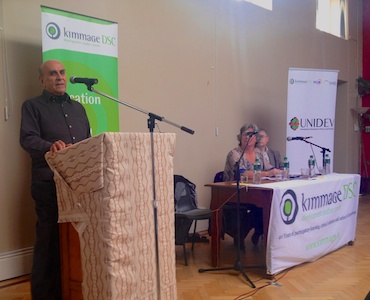 It does not prove difficult to persuade an anarchist to go to a meeting with the subtitle ‘ Anarchy and Buen Vivir (Good living)’ and more especially when the speaker, Gustavo Esteva, has direct links with the Zapatista Army for National Liberation (EZLN) who inspired the world with their uprising in 1994.
It does not prove difficult to persuade an anarchist to go to a meeting with the subtitle ‘ Anarchy and Buen Vivir (Good living)’ and more especially when the speaker, Gustavo Esteva, has direct links with the Zapatista Army for National Liberation (EZLN) who inspired the world with their uprising in 1994.
Gustavo was invited to speak by the Kimmage Development Studies Centre (DSC) as part of their 40th year celebrations. Gustavo addressed the gathering in the parish hall and started with the position that Development was counterproductive. Considering this was the Kimmage DSC’s raison d'être is to facilitate education and training for development practitioners, this was a sharp starting point.

